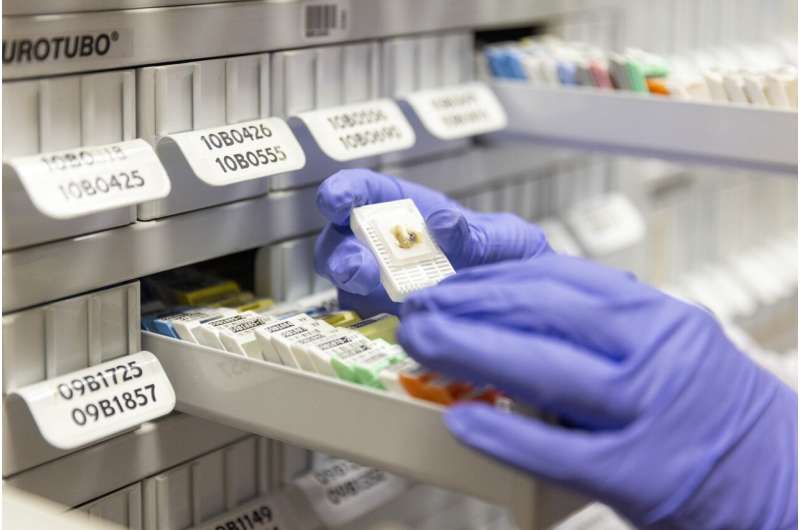This article has been reviewed according to Science X's editorial process and policies. Editors have highlighted the following attributes while ensuring the content's credibility:
fact-checked
trusted source
proofread
World's first collection of brain metastasis living samples will help treat each patient with the most effective therapy

At 18 Spanish hospitals, when a patient with brain metastasis undergoes surgery, they can donate a tiny part of their brain to the first repository of brain metastasis living samples in the world, based at CNIO (Spanish National Cancer Research Centre). It is a pioneering collection in the world, created to accelerate the search for therapies against brain metastasis, a disease that affects up to 30% of patients with systemic cancer.
The creators of this repository are two researchers from CNIO: Manuel Valiente, head of the Brain Metastasis Group, and Eva Ortega-Paíno, director of the Biobank, who have published an article in the journal Trends in Cancer on the advantages of the collection, called RENACER. In just three years, it has compiled samples from more than 150 patients.
The truly unique feature of RENACER, which makes it a valuable tool for the international scientific community, is that it contains living samples, conserved in cultures that enable the cells to continue behaving in a similar way as they were in the body.
A living biobank that enables organotypic cultures
"We have built a 'living' biobank," write Valiente and Ortega-Paíno. This characteristic can be "transformative, not only for research but also for clinical trial design, especially when focused on unmet clinical needs, such as brain metastasis."
The fact that the cells are living allows the researchers, for example, to study their response to specific drugs. RENACER paves the way to create avatars for each patient in order to identify the best therapeutic options in an individualized way.
"Research contracts have been already signed to exploit patient-derived organotypic cultures (PDOCs) as avatars, thus providing the possibility to generate biomarkers of sensitivity or resistance to specific drugs," the authors explain.
The hospitals involved with RENACER work as a network to pass on research findings to patients as quickly as possible. In fact, thanks to this network, there are already two clinical trials underway, which will determine the capacity of two biomarkers to discriminate cases in which radiotherapy—a technique with side effects—will be effective.
From the operating theater to the biobank in hours
The requirement for cells to be "alive" is not easy to achieve, since it involves a sophisticated logistics chain. The samples are taken from the operating theater in a special container, in their culture medium, at a temperature of between 4 and 8 degrees Celsius.
They must reach the CNIO Biobank, in Madrid, in less than 24 hours. There, they are processed, organotypic cultures are created, and they are divided into proportional parts that are stored as samples for future investigations. They are also analyzed using various techniques and sequenced, to extract as much information as possible from them. All the data are put into a database that is open to the international scientific community.
'It is pivotal to empower patients'
"This is happening just a few years after the project was launched," said Valiente. "It's a strategy that helps to improve knowledge as well as diagnosis and treatment options, but also brings all the people involved closer together: patients, core researchers, chemical researchers, health care professionals, and the biobank."
Patients, "[because they act] as donors during a difficult brain metastasis neurosurgery, play a crucial role and we strongly believe that it is pivotal to empower them," the researchers explain. GEPAC (Spanish Group of Patients with Cancer) is also involved with RENACER.
More information: Manuel Valiente et al, Updating cancer research with patient-focused networks, Trends in Cancer (2023). DOI: 10.1016/j.trecan.2023.09.002




















